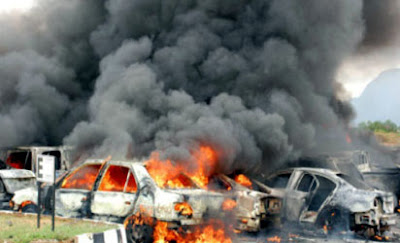Tuesday, 30 July 2013
29 feared dead, scores injured in Kano multiple blasts
Twenty nine fun seekers were feared dead and many injured, Monday night, in the multiple blasts that occurred at Christmas quarters in the Sabon Gari area in Kano. The Sabon Gari area of Kano, where four blasts were reported, is full out of outdoor bars and eateries and known for its bustling nightlife. According to reports the first blast occurred at about 9:12 p.m. at Enugu/Igbo Road near International Hotel, while the second blast followed three minutes later, at exactly 9:15 P.M.
The Spokesman of the Joint Task Force, Captain Ikedichi Iweha did confirmed Kano multiple blasts, and warned residents to remain calm as heavily armed security operatives have cordoned off the area as at the time of filling this report. “We have had some explosions in Sabon Gari this evening. The explosions happened at open air beer parlours, where people were playing snooker,” Kano State Police Commissioner Musa Daura told AFP. “I can confirm six dead and six others injured,” he said, adding that the cause of the blasts was not immediately clear. “There is confusion all over the place,” said Chinyere Madu, a fruit vendor.
“There were four huge explosions, so huge that they shook the whole area. Everywhere is enveloped in smoke and dust.” She told AFP the scene was too chaotic to assess the extent of the damage, but said she “saw one person carrying someone on his shoulders with bleeding legs.” “My house is not far from there,” resident Kola Oyebanji told AFP. “All my windows are shattered.” Other residents said that a small church sandwiched between two bars had been among the targets. The blame was likely to fall on Boko Haram, the Islamist insurgent group which says it is fighting to create an Islamic state in Nigeria’s mainly north. The group, which has carried out waves of bombings across northern Nigeria, has been blamed for coordinated suicide blasts at a bus park in Sabon Gari in March that killed at least 41 people.
Kano has been among the cities hardest hit during the Boko Haram’s insurgency, even if in recent months it had seen a lull in attacks. Following a massive coordinated gun and bomb assault in January of 2012 that killed at least 185 people, security forces blanketed the city, setting up checkpoints at many roundabouts and intersections. Nigeria launched a massive offensive against Boko Haram in May, specifically targeting three states to the east of Kano. Since then, the security forces have claimed huge gains against the insurgents, insisting that they have put them on the defensive.
Attacks eased after the offensive was launched but the bloodshed has persisted in some areas. At least three schools have been attacked in northeastern Nigeria by suspected Boko Haram members. Over the weekend, a vigilante raid and reprisal attack by Boko Haram members left at least 20 people dead in the village of Dawashe in Borno state. The insurgency is estimated to have killed more than 3,600 people since 2009, including killings by the security forces. Aside from churches and other targets linked to the Christian community, Boko Haram has attacked the security forces, Muslim clerics and various symbols of authority. Nigeria is Africa’s most populous country and top oil producer, roughly divided between a mostly Christian south and predominately Muslim north.
Subscribe to:
Post Comments (Atom)



No comments:
Post a Comment